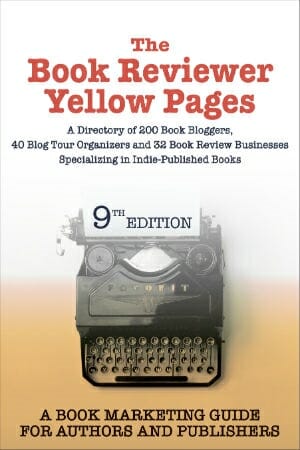Book reviews can be incredibly influential for self-publishers. Good reviews take your work seriously, amplify your message by reaching thousands of readers, and give you a credibility you just can’t get any other way.
But how to get reviews? That’s the question that plagues self-publishers, so I was excited to learn that publishing expert David Wogahn had acquired and published a new edition of a resource I’ve known about for years. I asked David to fill us in on how self-publishers can get started with book reviews, and here’s his response.
(And don’t miss the great giveaway David is running: details below.)
By David Wogahn
The challenge for self-publishers, especially new authors who have small or nonexistent networks, is to convince readers to add one more title to their to-be-read pile. Unfortunately, most self-publishers do not (yet) have a reputation that confers credibility upon their books. That’s where book reviews can help; they contribute credibility and raise awareness in four distinct ways:
- Customer reviews encourage shoppers to learn more. Reader reviews are a social signal, much like a full parking lot or a line in a store are signals of something worth paying attention to (and paying for). The importance of customer reviews has increased as more books are sold online. Having numerous outstanding customer reviews on a retailer’s website acts as a positive social signal to readers, encouraging them to buy the book.
- Quotes add gravitas. Editorial reviews—written by those assumed to be professionals—play a different role. These are often used in the book or in sales materials and still matter to certain audiences, especially trade audiences such as book retailers and librarians. Positive editorial reviews can help a book get into the hands of these gatekeepers, but self-publishers need to be careful. Small Press United points out that one of their reasons for declining publishers is that the
“Quotes used on the front and/or back covers are not from people with impressive credentials.”
In other words, the source for your quote(s) should be credible to the audience you are marketing to or the review may result in the opposite effect to what is desired—or simply be ignored.
- Reviews are marketing. It is not uncommon for the media to contact authors after seeing a review posted online or finding it in an online search. David Meerman Scott used his review of a Bob Marley CD to say he had taken photos of Marley’s last concert. The producers of the documentary Marley found that review and contacted Scott, who shared his photos and received a film credit.
- Reviews provide validation to third parties. It is common for promotional sites such as BookBub to have minimum review requirements before considering a book for promotion—both in number and average stars. Having great reviews in spades will help your book be accepted for promotional opportunities it might not otherwise qualify for.
Bottom line: numerous (positive) reviews help your book
- sell more copies
- be seen more favorably
- get more promotional opportunities
4 Primary Sources of Book Reviews Available to All Self-Publishers
Self-publishers have an expanding range of choices for soliciting book reviews. There are now far more options than self-publishers had just 10 years ago, which is helpful since reviews by traditional media continue to shrink (for traditionally published books as well).
Here’s how I break them down:
- Your network. Addressable via email or social media, this is your best option. However, it takes time to build a mailing list of loyal fans which makes it a less viable option for new self-publishers.
- Readers posting reviews online. Offering your book to people who have reviewed books like yours is one of the best strategies. You can visit Amazon, find similar books, and click the names of the reviewers. This is an arduous process, however, because many don’t include contact information and those who do are often swamped by review requests. Fortunately, there are services that help speed this up.
- Book bloggers. This source of reviews continues to offer one of the best returns on your time investment. Why? Because you get a two-fer: a review, often posted in multiple places, and promotion when the blogger shares their review on their website and via social media.
- Review businesses, or businesses offering reviews. There is often a cost associated with pursuing book reviews from businesses such as Kirkus and NetGalley. Others, such as Booklist and Shelf Awareness, do not have fees but have other requirements that are often onerous for self-publishers (such as not accepting print-on-demand books or requiring review copies three or more months prior to publication).
How The Book Reviewer Yellow Pages Helps Authors

As Joel pointed out in his primer on book reviews for self-published authors, soliciting book bloggers offers one of the best returns on an author’s time—when done correctly. And as noted above, there are other sources for book reviews such as review businesses—that can provide editorial reviews—and readers who regularly read and post reviews on websites such as Amazon and Goodreads.
The challenge is to find a wide range of reviewers for a particular book, and to do so in the most expeditious way possible. The Book Reviewer Yellow Pages was designed to do just that.
Published annually since 2009, this directory of book bloggers, blog tour organizers, review business, and resources has helped thousands of authors navigate this important element of book marketing.
The new 9th edition has been completely revamped with the most up-to-date information. In it you will find:
- 200 book bloggers profiles including contact information, reading preference, and all relevant information needed for a strong pitch. Authors can quickly find bloggers using the index. This saves authors from having to search on the blogger’s site, or having to sift through online databases that contain a fraction of the information they need.
- The directory’s 40 blog tour organizers serve as virtual assistants of sorts by contacting bloggers on behalf of authors, saving them time and perhaps achieving a broader marketing reach than authors can do on their own.
- There are also 32 listings for book review businesses, further broken down into categories for traditional (free) reviews, paid reviews (such as Kirkus), hybrid reviewers (such as Foreword Reviews), and services (such as Goodreads).
The Book Reviewer Yellow Pages contains the time-tested guidance authors need to zero-in on the reviewers who may be interested in their book. Once you have the list of reviewers you want to contact, use the quick start guide, outreach checklists, and sample email template to begin soliciting book reviews.
It is the only comprehensive source of influential book reviewer profiles and book review guidance you can buy today, and I am giving away a book review jumpstart package to celebrate publication of the new edition.
The package includes a copy of the directory in print and eBook formats, a copy of Joel’s The Self-Publisher’s Ultimate Resource Guide, and a professionally managed blog tour from one of the directory’s blog tour organizers.
To enter, leave a comment on this post. Yes, that’s it! Here are some ideas for your comment:
- What are your best tips for contacting book reviewers?
- Do you have a favorite book blogger?
- What is your favorite blog tour company?
- Do you read reviews from book review businesses like Kirkus?
Even if you don’t win the book review jumpstart package, the first 10 people to comment will receive a free eBook edition of the directory. The winner of the book review jumpstart package will be chosen at random from all contributor comments one week from today, January 22.
 David Wogahn is the publisher of The Book Reviewer Yellow Pages, published annually since 2009, and the president of AuthorImprints.com. He is also the author of Register Your Book, a Lynda.com publishing course, and a past instructor for IBPA’s Publishing University. Learn more at BookReviewerYellowPages.com.
David Wogahn is the publisher of The Book Reviewer Yellow Pages, published annually since 2009, and the president of AuthorImprints.com. He is also the author of Register Your Book, a Lynda.com publishing course, and a past instructor for IBPA’s Publishing University. Learn more at BookReviewerYellowPages.com.
Photo: BigStockPhoto



